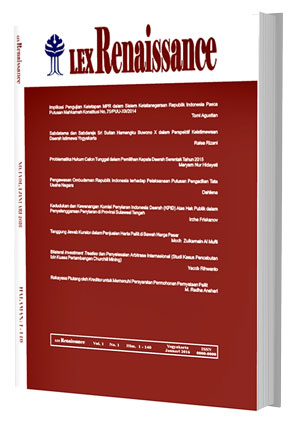Main Article Content
Abstract
This research aims to analyze and answer issues concerning a notary’s responsibility by criminal law and legal protection of notary in preparing the notarial deed for the official record of an extraordinary general meeting of shareholders (EGMS). This study is qualitative normative juridical legal research. The sources of this research material are obtained from secondary and tertiary legal materials. Substantial legal materials are then systematized, analyzed and given arguments to obtain conclusions on both issues discussed. The results of the study indicate that a notary cannot be liable in criminal penalties relating to EGMS notarial deed because the deed is a partij acte that is entirely based on the acts and statements of the parties involved and has been set as a draft. Therefore, the preparation of such official record becomes the responsibility of the involved applicants. The legal protection for notary against a criminal case is stipulated in Article 66 Paragraph (1) of Law on Notary, stating that investigators, prosecutors, and judges can obtain the copy of the original deed and call the notary to be present in the investigation only with the approval of the Notary Honorary Council in advance. In this case, such requirement is not fulfilled because a regulation from the Minister of Justice has yet to be established further to stipulate the Notary Honorary Council as mandated by the Law on Notary Article 66 A Paragraph (3).
Keywords: Notary; legal protection; criminal liability
Article Details
Authors who publish with this journal agree to the following terms:
a. Authors retain copyright and grant the journal right of first publication with the work simultaneously licensed under a Creative Commons Attribution License that allows others to share the work with an acknowledgement of the work's authorship and initial publication in this journal.
b. Authors are able to enter into separate, additional contractual arrangements for the non-exclusive distribution of the journal's published version of the work (e.g., post it to an institutional repository or publish it in a book), with an acknowledgement of its initial publication in this journal.
c. Authors are permitted and encouraged to post their work online (e.g., in institutional repositories or on their website) prior to and during the submission process, as it can lead to productive exchanges, as well as earlier and greater citation of published work (See The Effect of Open Access).



